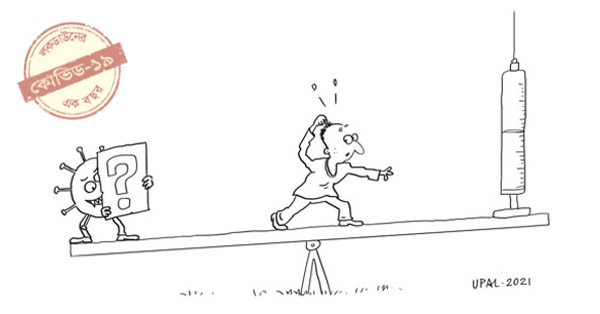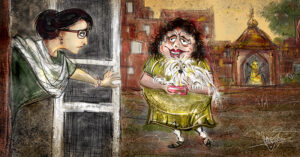Prof Sunetra Gupta, an epidemiologist in the department of zoology, University of Oxford, was one of the first to question lockdown as a tool to contain the Covid-19 pandemic. A year later, serial lockdowns have failed to quell the number of cases, and countries which took less stringent and draconian measures have achieved the same results as those who clamped down on citizens.
As we complete one year of living with the pandemic, Prof Gupta speaks of the impact of the vaccine, the challenge of new mutating strains and the policies of the World Health Organisation (WHO), different countries and vaccine rivalries.

It is exactly a year since lockdown was clamped across India. Back then, is this where you predicted things would be in March 2021?
I wouldn’t have thought we would have had to go through extended periods of lockdown, so that is the one thing I would never have predicted. It does not surprise that we have a vaccine, particularly one that can protect the vulnerable population. I had actually said that we could even get something up to that standard by even September last year.
I wouldn’t have imagined that countries would have rushed into sustained lockdown. I never thought of lockdown as anything other than a very temporary measure available only to countries who have enough resources to support their citizens through such a period.
In other words, not India or South Africa, where it should never have happened.
As time went by many countries have adopted similar lockdown measures, including the UK. What is the ideal approach to dealing with the spread of the virus?
Lockdown is not an option for any civilised country that cares for the damage it does, particularly to the poor and the young. It should not be on the table. I’m not saying it cannot be adopted for a two-week period while governments are planning on how to use resources – that’s different – that’s what the UK government had claimed they were doing. But to use lockdown as a means to suppress infection is a fallacy for various reasons.
You can’t sustainedly keep down infections unless you keep lockdown forever, which is obviously absurd. Let me explain it another way. Let us assume lockdown works, about which there is mounting doubt. If they do work, all they can do is delay the spread. If you could have locked down till the vaccine that will prevent people from dying, that sounds like something of an option. But practically speaking, that is not a strategy, because we had no idea when the vaccine would arrive and when it would be administered. Any lockdown for an extended period of time has enormous costs, huge costs, so it is simply not an option.
What we had advocated in countries that can afford it is ‘Focussed Protection’ where you shield vulnerable individuals from infection while the epidemic is raging, which is only a period of three to six months. After that the risks are reduced to the same level of other corona viruses or influenza and other diseases we live with – not to mention the big killers like tuberculosis, HIV, diarrhoeal diseases. You needed to keep things in perspective, which did not happen.
Focussed protection is what we should have done in the UK and the US. How do you have focussed protection in places where people live in close proximity and can’t even be put in a different room, you might ask. However, such places have done actually done better than countries that went into lockdown.
The fact is, lockdown actually exposed the vulnerable. In the UK essential workers were allowed to go out even when they had diseases like diabetes which made them vulnerable. They were the ones who should have been paid to stay at home. Instead, those who were paid to stay at home were those that my fried Martin Kulldorff (the renowned biostatistician) calls the ‘laptop classes.’ These people, the middle-classes, were protected by the lockdown, the lower classes were not. Children and students, the younger generation were hugely harmed by the lockdown.
We keep hearing about herd immunity. How does it tie in with vaccination and what percentage of the population needs to be vaccinated for herd immunity to set in?
Those are questions that are unfortunately rather widely misunderstood by many scientists. Herd immunity is a natural phenomenon during an epidemic where most people are susceptible to infection but not all of them are susceptible to disease (illness), as we have seen. That is how it (the pandemic) takes off — many people get infected. These people become immune because that’s what we do, we acquire natural immunity. We know now that we get natural immunity to this coronavirus as we do the others — there are four of them circulating. As soon as significant numbers in the population get the virus, it gradually consumes its own resources and begins to decline. The virus’ ability to spread is affected by how many people are immune. We never reach that point where everybody is immune, but we reach a point where a sufficient number are immune. The number infected and the risk of disease reach a manageable level, that’s what happens to all infectious diseases.
If you have a vaccine that prevents infection you can limit the level of infection to a point where it is manageable. Perhaps you could even cross that ballpark figure in which case the disease might get eradicated, but that has only happened with small pox.
Some vaccines are incredibly useful like the measles vaccine which protects infants against a potentially fatal disease. The coronavirus vaccine is not like that because Covid-19 is not like measles. You get infected, you become immune, you lose the immunity and can get re-infected. However, if you do get re-infected, there is very little chance of severe disease.
The vaccine is protecting people against disease and death. It does not protect against infection at least not for long. What we need to do with the vaccine is to protect the vulnerable. The beauty of it is that we can now protect them in places where they can’t be kept isolated for their safety.
It would be a fallacy to expect the vaccine to confer herd immunity, which will arise mostly through infection. Has it happened in India? I think yes, in certain pockets of India and UK we do have herd immunity.
For some reason there is a resistance to that idea in the UK possibly because it justifies the continuation of lockdown which seems to be in some people’s interest.
The joy of the vaccine coming was tempered by the emergence of new strains. Do the vaccines in circulation provide protection against mutating strains?
The vaccine is very likely to protect against all strains because we have given the vaccine an easy low bar which is to protect against severe disease and death. All the vaccines are equipped to protect against all the strains. Viruses do mutate and do evade some types of immunity. However, experiments have shown that if you get the jab, you have some protection against the new strains.
These strains have achieved what is called immune-evasion but that should not interfere with the protection against disease and death provided by vaccination. There is nothing to be worried about as far as mutations are concerned.
In terms of how it is going to evolve, people tend to see it as a linear narrative where there is a virus and it mutates to become more and more fierce and virulent. That is not true and that is not how evolution works. The different strands share certain mutations because those are the only ones that give it any kind of advantage at all (over our system). I wouldn’t have anticipated that these mutants would emerge, I had thought this coronavirus was more stable than that. I did not think it was capable of immune evasion. Interestingly, there was work done in Kolkata by Partha Majumdar and others which showed there was early change which might have increased its transmissibility. There was a difference in what was spreading in China and what spread in Italy and that early change may also have conferred a slight increase in its ability to transmit. Less fuss was made then than now, when everyone is jumping up and down when another mutation has been discovered.
This strand (the one in UK) more successful and will out-compete the other strains but there is nothing to worry about as the vaccine will still protect against it. Further, the vaccines can also be adapted to cover for a new strain. If there is another round of vaccination to protect the vulnerable we can adapt the vaccine to protect against the new strain. It is not a huge problem.
‘My vaccine is better than yours.’ As a scientist how do you react to the nationalism and politics accompanying the rollout of different vaccines?
The politics of vaccines, one might anticipate. This is capitalism in its most naked form. I think all vaccines should be sponsored and distributed by the state. There should be no profit-making through vaccination or any other medical intervention for that matter.
None of what has happened comes as a surprise. Nations, who have moved away from internationalism towards inward-looking policies, and big pharma whose job it is to make profit have become a toxic combination. This would lead to these kinds of wars. What surprises me a lot more, is how some of the ideas of how to contain the virus even when we have a vaccine are so inward-looking and nationalistic.
The way people laud New Zealand for example or even UK, where travel is severely restricted, is against all principles of internationalism. I never imagined this would ever happen.
How would you assess the role of World Health Organisation (WHO) amid the pandemic?
I’m not impressed. I saw no consistent plan or logic in their statements. They were recommending lockdowns one minute, not recommending them the next minute; they changed the definition of herd immunity on their website. Quite astonishing! I don’t think they’ve done a stellar job of even hearing a wide set of voices, and responding to them. All that is visible is an organisation flailing around, I’m sure their hearts are in the right place, but I don’t see any coherent discussion of options or any real acknowledgement of the enormous harm caused by lockdown in most of the world.
The effects have already been absolutely devastating. The job of the WHO was to say that if a country wants to lockdown, we need to understand why you are doing it. We have to ensure it is not a go-to policy in countries where it would immediately cause deaths.
How do you assess different countries with the way they handled the pandemic?
New Zealand: Incredibly inward-looking and nationalistic. The idea that you can keep a virus out indefinitely is wrong. The strategy implemented relied on a vaccine being available at some point, a vaccine that they would not be making, since they can’t. They were relying on the rest of the world to provide a vaccine that would protect them, even as they were keeping the rest of the world out of their country. I am not saying it is completely unjustified if you say: I need to protect my citizens, but one needs to be apologetic about it rather than being self-congratulatory. As soon as they open their borders they will have infections, even if they vaccinate everybody.
USA: Having been to the America in October and speaking to the health minister there, different states have coped differently. An overall assessment would be that it was very devolved, and what was done with regard to masks, mandates and measures was very heterogenous. Different states approached the situation differently, and the state that did well was Florida. They adopted focussed protection for the elderly and they have not done any worse than California which adopted draconian measures.
Sweden vs UK: Sweden is a very useful counterpoint to the UK way. Sweden did not bring in very harsh measures but did recommend certain sustainable measures: avoid crowded areas if you’re vulnerable, wash your hands, don’t touch your face. They themselves would admit they did not do the best job of protecting the careworkers. Overall, they managed well with their deaths and mortality, which are similar to UK.
The UK lockdown has brought about the closure of hospitality and the arts, families are not legally allowed to see their sons and daughters. The whole thing is very cruel. Children have only just been allowed to go back to school. All of this was not done in Sweden – they had a much lighter version of what happened here and yet the UK have not done much better than Sweden on any of the parameters.
The Swedish model is a good one, if I had to pick a model it would be Sweden.
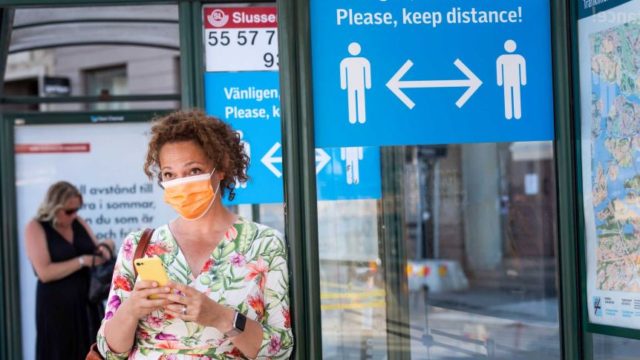
India: The problem with Covid is that the epidemic spreads at a regional level. It has spread in Maharashtra and I am hoping it has crossed its peak in Bengal. Overall, the epidemic has behaved exactly as expected to in every region — it comes in, spreads quite rapidly, sufficient numbers become immune and it goes away. It will probably re-emerge again next winter, but hopefully would not be a big problem.
In some parts herd immunity is happening already, and there are pockets where it has not yet spread, and these too will be affected at some point. It is foolish to say most of India has achieved herd immunity.
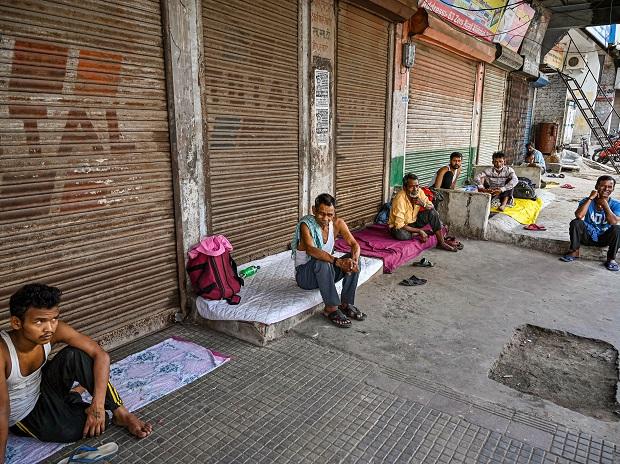
Globally, in temperate regions it goes away in summer and comes in the winter. It is not as clear in places like India. Maybe the monsoons might create the conditions for it to come back, even in 2020 that was when it spread rapidly. I did not expect it to come back significantly in South Africa but it did get very damp and that might have set off the wave. Also, in large regions it can spread in pockets. Therefore, just because there is 50 per cent seropositivity in Dharavi, it does not mean that it will not spread through Malabar Hills.
UK: The numbers are extremely low right now. There has been a significant accumulation of herd immunity. The people who are advising the government will claim it is because of the lockdown. The truth is we have vaccinated almost everyone who is vulnerable and we should have opened up a long time ago.
Academics, for example, have had a pretty good time, working from home on their laptops. The people we shoved under the bus are the poor and the young. It is absolutely tragic that children were prevented from going to school, and even now have to wear masks and have their noses swabbed, which are hugely problematic. Children are being made to suffer for a problem that is not even theirs. I am very disappointed right now.
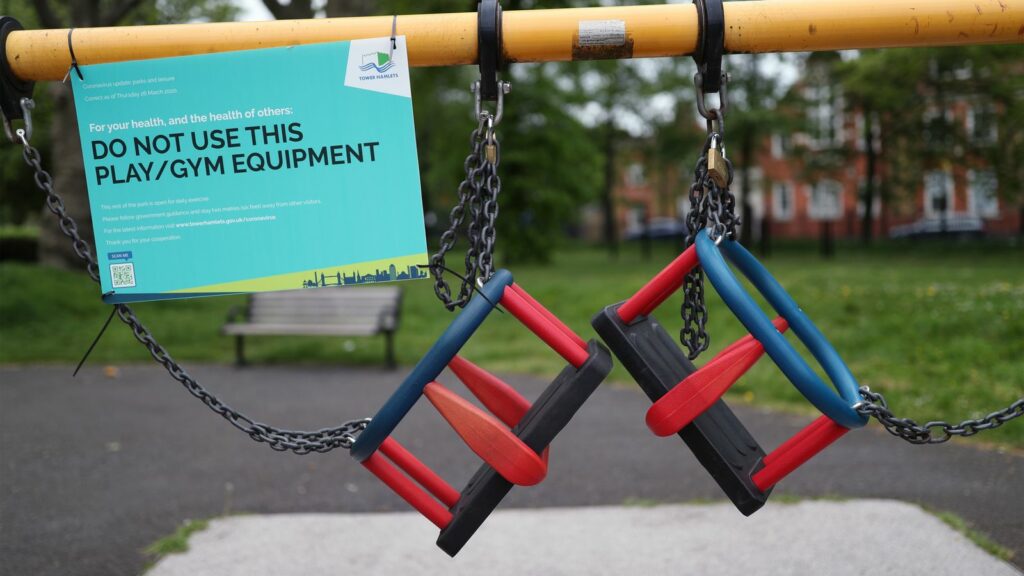
On a personal level, how was it working on this pandemic?
There are lots of layers to that. It was really harrowing since my views challenged the government and the people who were advising the government. There was huge resistance which took the form of ad hominem attacks. Campaigns were set up to stop us from being heard, with some academics going on social media to make terrible accusations about our motivations.
Obviously you can challenge the science because that is up for debate, policy recommendations are up for debate, but what we’ve received instead for our views (of ensuring focussed protections as opposed to lockdown) is brutal personal attacks.
But at the same time, it has connected me to wonderful like-minded people who arrived at similar conclusions about focussed protection. Like me, they are motivated to speak about the effects it has on the poor in this country and globally. We have united to try and put forward this strategy and raise awareness about the damage done by lockdown and offer other solutions to battle the spread.
UK has blown 37 billion pounds on trying to track-test-tag in order to eliminate the virus – a plan that was unlikely to work. These funds have gone but along with that so have grants for collaborations with developing countries. For example, the grant for my study of poultry health has also been stopped. This is just the start of the devastating cutbacks that will follow.
You are an award-winning author. How will this pandemic be chronicled in literature?
I certainly would not want to write anything about it. There are some pandemics which have taken a firm place in our imagination. The plague for example has a lot of literature, both real and imagined, with Albert Camus being the canonical example of someone who highlighted that.
What is interesting is that the 1918 Spanish flu did not enter the literary imagination the same way. Katherine Anne Porter wrote a very nice short novel on it, Pale Horse Pale Rider. Even though 50 million people died because of the Spanish Flu, it did not become central to any literary experience. Some will exploit the current situation, so a bit of writing will emerge from this period. I also feel you need to contemplate it over a period like this one before it can enter literature.

How do you see the world in 2022?
There is absolutely no reason to not be normal now. We should urgently vaccinate the vulnerable in developing countries where they cannot isolate in any other way. My mother is living in Kolkata and has had her first vaccine shot. She has led a very careful life so far and people like her should get vaccinated soon. The vaccine needs to reach the elderly and those with co-morbidities as soon as possible.
Simultaneously, herd immunity has done a good job and if infections come down, it will reach the endemic state, a state we tolerate for other pathogens. We don’t avoid meeting our grandchildren because we fear influenza. We have accepted that life comes with risks and this is especially true of countries where you do not have the luxury of sealing yourself off.
